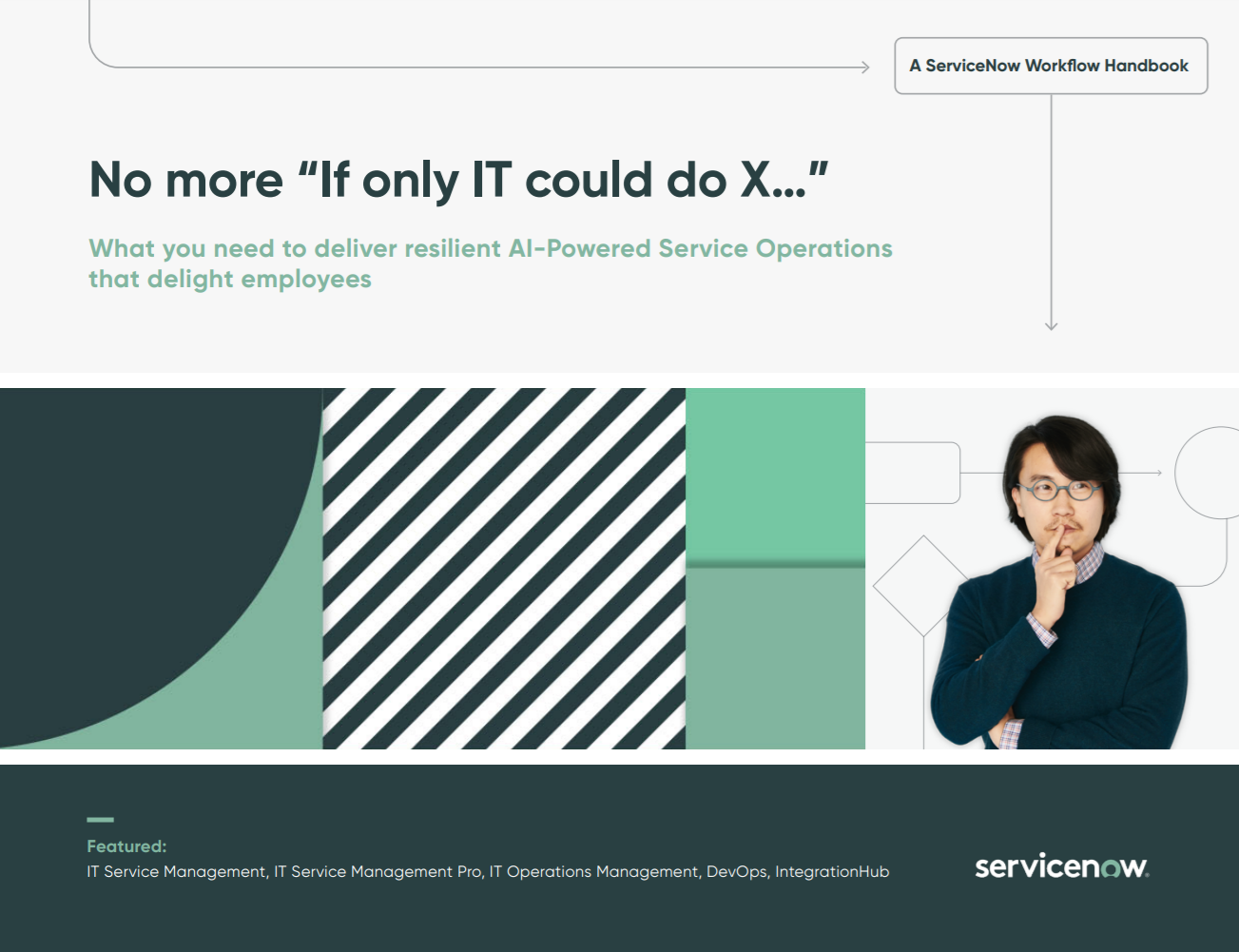Nurturing your business’ citizen developers
With enterprises increasingly struggling to locate skilled developers, what if the developers your business needs are already in your company?


Seeking out developers is increasingly difficult for many businesses, especially considering the widening digital skills gap. Evolving the technical skills within your own workforce, therefore, could resolve an immediate need while delivering technical resources that could transform how your enterprise innovates. The low-code or no-code citizen developer is here – and could be hidden within your company. The ideal candidates are people who embrace change and might be the first to try new digital applications or services; they don’t shy away when new business tools are introduced. With most developers suffering from burnout, too, cultivating citizen developers is a timely ambition.
RELATED RESOURCE

ITSM workflow handbook: No more "If only IT could do X"
What you need to deliver resilient AI-powered service operations that delight employees
In its Technology Vision 2020 report, Accenture highlights a trend it calls “post-digital people”, with the research stressing the need for technologies to become more humanised as businesses change the way they use them. “Digital technology is evolving from an advantage to a basic expectation – and yesterday’s best practices are turning into today’s shortcomings,” the report says. The research concludes 76% of business leaders believe they need to re-engineer how people and technologies are bought together. In the context of businesses redrawing digital transformation roadmaps following COVID-19, boosting technical skills across the existing workforce has powerful potential.
“Across our global membership network, we’ve seen businesses from all sectors turn to the citizen developer movement as a solution to address the ongoing digital skills gap,” says Ashwini Bakshi, Project Management Institute (PMI) Managing Director for Europe and Sub-Saharan Africa. “The uptake of digital transformation has accelerated at a rapid rate as a result of the pandemic and, unfortunately, many organisations are struggling to keep up. Citizen development can help bridge this skills gap by encouraging employees to take an active role by embracing no-code or low-code platforms.”
Build your own
Waiting for IT teams to build the tools and digital services a business needs is no longer as viable as it once was, given how thinly they’re being stretched. If expanding an IT department through traditional recruitment isn’t possible, then business leaders must look elsewhere and, more specifically, inwardly.
Indeed, a variety of coding tools that have become available recently allow anyone to create bespoke applications, according to a spokesperson from software firm Mendix. “Low-code platforms provide companies with a visual, drag-and-drop approach that empowers non-technical staff to design these critical applications, in collaboration with and under the supervision of IT,” the spokesperson tells IT Pro. “This allows businesses to quickly deliver digital solutions that immediately support their strategic needs while enabling the IT department and other divisions to work in a more agile and collaborative manner.”
Founder and CEO of Supermums, Heather Black, is using the citizen developer model to evolve how organisations and individuals innovate and push their entrepreneurial ambitions. “Supermums has helped create thousands of citizen developers and relaunched and reimagined the same number of careers,” she claims. “One such career-changing mum is London-based Divya, who used to be a secondary school Spanish and Chemistry teacher until COVID-19 hit and she harnessed the power of digital to relaunch her career. She now works as a Salesforce administrator at Advice UK, the largest support network for independent advice-giving organisations, providing products, services and networking opportunities, as well as seeking to influence government to improve policies, legislation and funding.”
There’s no denying that businesses are struggling to fill the developer roles they need. Citizen developers, however, shouldn’t be considered like-for-like replacements for what are, in fact, specialist positions. Rather, this model serves as a means for companies to use the untapped talent they have at their disposal to augment the existing pool of developers in their IT departments. Encouraging innovation within teams that are fully supported, moreover, can deliver the agility many enterprises have struggled to unlock.
Get the ITPro daily newsletter
Sign up today and you will receive a free copy of our Future Focus 2025 report - the leading guidance on AI, cybersecurity and other IT challenges as per 700+ senior executives
Becoming a disruptor
Creating a culture of innovation within your company could lead to dramatic changes and disruptive innovation. According to a historic KPMG report, being taught new skills, feeling valued and being invited to share creatively and contribute ideas builds ownership, satisfaction, and loyalty. Business leaders, therefore, must ask themselves how they can transform their organisations into ideal host organisms to foster innovation.
RELATED RESOURCE

ITSM workflow handbook: No more "If only IT could do X"
What you need to deliver resilient AI-powered service operations that delight employees
This culture of innovation should guide how citizen developers approach the tasks they’ve been set, with a traditional, siloed approach to IT detrimental to businesses aiming to innovate at pace. Such an approach doesn’t dictate but empowers and facilities ideas, feeding into concrete projects that may, or may not, lead to the disruptive services and products that businesses seek. The enterprises that will thrive in the future are those that foster environments in which teams have the tools and skills to pursue all kinds of ideas.
Making this transition to include more citizen developers within a business, however, demands a change of attitude to innovation, as well as how innovation happens. Decentralising application development, for instance, will come more easily to some companies than others, and, of course, this method of innovation won't suit all enterprises across all sectors.
PMI’s Bakshi concludes that businesses embracing their citizen developers are those most likely to become the enterprises that will shape the post-pandemic future. “Ultimately, it’s about active training and delivering outcomes,” he says. “Reaping the benefits and innovations of citizen development can create real positive change for your organisation during a time of constant change and adaption, but doing it right is important. To utilise citizen development in a risk-free environment means investing in training and development, building performance feedback loops, along with an understanding of global standards of practice.”
Given the new commercial realities of the post-pandemic era, empowering a workforce to use its untapped technical skills to bring ideas to life is a powerful way for businesses to innovate. The rise of the citizen developer, of course, will be more transformational for some organisations than others. Those companies, however, that can unlock the technical expertise that’s previously been hidden beneath the surface might be able to take advantage of a new era of development.
David Howell is a freelance writer, journalist, broadcaster and content creator helping enterprises communicate.
Focussing on business and technology, he has a particular interest in how enterprises are using technology to connect with their customers using AI, VR and mobile innovation.
His work over the past 30 years has appeared in the national press and a diverse range of business and technology publications. You can follow David on LinkedIn.
-
 Bigger salaries, more burnout: Is the CISO role in crisis?
Bigger salaries, more burnout: Is the CISO role in crisis?In-depth CISOs are more stressed than ever before – but why is this and what can be done?
By Kate O'Flaherty Published
-
 Cheap cyber crime kits can be bought on the dark web for less than $25
Cheap cyber crime kits can be bought on the dark web for less than $25News Research from NordVPN shows phishing kits are now widely available on the dark web and via messaging apps like Telegram, and are often selling for less than $25.
By Emma Woollacott Published
-
 Employees want purpose, and they’re willing to quit to find it – upskilling, career growth, and work-life balance have shifted priorities for workers
Employees want purpose, and they’re willing to quit to find it – upskilling, career growth, and work-life balance have shifted priorities for workersNews Employees want purpose and meaning at work — and if they don't get it, two thirds would quit to find it.
By Nicole Kobie Published
-
 DEI rollbacks could exacerbate tech talent shortages – nearly half of recruitment leaders worry diversity cuts will impact their company’s appeal and employee retention
DEI rollbacks could exacerbate tech talent shortages – nearly half of recruitment leaders worry diversity cuts will impact their company’s appeal and employee retentionNews Finding talent with AI skills has already become a major challenge for enterprises, but with some enterprises shelving DEI hiring practices, research suggests the situation could get worse.
By Emma Woollacott Published
-
 Tech firms eye temps to plug talent gaps
Tech firms eye temps to plug talent gapsNews The tech industry could be set for a spike in temporary hiring, according to a new study from recruitment firm Robert Walters.
By George Fitzmaurice Published
-
 IDC InfoBrief: Sustainability doesn’t need to be all stick and no carrot
IDC InfoBrief: Sustainability doesn’t need to be all stick and no carrotwhitepaper CIOs are facing two conflicting strategic imperatives
By ITPro Published
-
 Five ways to drive innovation at the edge
Five ways to drive innovation at the edgeWhitepaper How an effective edge strategy can generate new value for your organization
By ITPro Published
-
 Google launches AI training scheme to “supercharge” SMB productivity
Google launches AI training scheme to “supercharge” SMB productivityNews The ‘easy-to-follow’ course aims to bolster SMB leaders’ understanding of machine learning and AI
By Ross Kelly Published
-
 What is quiet hiring?
What is quiet hiring?In-depth Far from being the latest industry buzzword, quiet hiring could be the perfect antidote to the widening skills shortage
By Ross Kelly Published
-
 How IT professionals can change careers to cyber security
How IT professionals can change careers to cyber securityIn-depth The widely known cyber security skills gap might tempt IT professionals into a career change, but what’s the best way to navigate this switch?
By Kate O'Flaherty Published